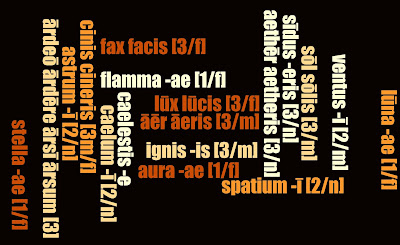This is the account to which below refers: the riot and bloodshed at the amphitheatre of Pompeii (AD59) reported
by the Roman historian Tacitus. When dealing with an original Latin text, word
order will become a major player, and so I have broken it up into clauses and
phrases and then matched them with the English translation.
(1)
[1] Sub idem tempus ¦ [2] levī initiō ¦ [3] atrōx caedēs
orta ¦ [3] inter colōnōs Nucerīnōs Pompēiānōsque ¦ [4] gladiātōriō spectāculō ¦
[5] quod Livinēius Rēgulus, ¦ [6] quem mōtum senātū rettulī,
¦ edēbat.
[1] At about the same time ¦ [2] from a trivial beginning ¦
[3] arose terrible carnage / bloodshed ¦ [4] between the inhabitants of
Nucernia and Pompeii ¦ [4] at a gladiatorial show ¦ [5] which Livineius
Regulus ¦ [6] whom, as I have related, had been expelled from the
Senate ¦ was staging.
caedēs, -is [3/f]: slaughter; massacre; carnage; some
translations of atrōx caedēs are less dramatic e.g. “serious
affray” and “serious trouble”, but caedēs is stronger than
that, suggesting bloodshed and killing i.e. it wasn’t just a spot of
"trouble" because it reached the Senate and Tacitus wrote about it.
ēdō (with long /ē/), -ere, ēdidī [3]: give out; produce;
publish (from which there are the English derivatives editor and edition);
here it is referring to games organised, and presumably financed, by Livineius;
Note: edō (with short /e/), -ere, ēdī [3]: eat
īdem [m], eadem [f], idem [n]: the same
levis, -e: light, trivial, trifling
mōtus, -a, -um: (literally) moved; mōtum senatū:
expelled from the Senate
ortus, -a, -um: having arisen
referō, referre, retulī: (here) report; relate
(2) This section starts, in a sense, no differently from a
football match nowadays where the rival fans are shouting at each other, but it
soon turns nasty …
[1] quippe oppidānā lascīviā ¦ [2] in vicem incessentēs
probra, ¦ [3] dein saxa, ¦ [4] postrēmō ferrum sūmpsēre,
¦ [5] validiōre Pompēiānōrum plēbe, ¦ [6] apud quōs spectāculum edēbātur.
[1] For with unruliness typical of townsfolk ¦ [2] hurling
abuse in turns / at each other ¦ [3] they then took up stones ¦
[4] and finally weapons ¦ [5] with the people of Pompeii being / proving to be
the stronger [i.e. the Pompeians had the upper hand] ¦ [6] where (literally:
among whom / in whose presence) the show was being staged
ferrum, -ī [2/n]: iron, but can refer to any metal tool
including a weapon or a sword
incessō, -ere, incessīvī [3]: assault; attack; abuse
invicem or in vicem: in turns; alternately
lascivia, -ae [1/f]: can be positive i.e. playfulness, or
negative: wantonness; Tacitus writes that the incident grew from a trivial beginning
(levī intiō) and so, possibly, what simply began as light-hearted
“pot-shots” got out of hand
probrum, -ī [2/n]: insult; abuse
quippe: used to introduce an explanation or cause i.e. for,
indeed, in fact
sūmpsēre = sūmpsērunt: they took (up) < sūmō, -ere,
sūmpsī [3]: take
validus, -a, -um: strong; comparative: validior, -ius:
stronger
(3)
[1] ergō ¦ [3] dēportātī sunt in urbem ¦ (2) multī ē
Nucerīnīs ¦ [4] truncō per vulnera corpore, [5] ac plērīque līberōrum aut
parentum mortīs dēflēbant.
[1] Therefore, ¦ (2) many of the Nucerians ¦ [3] were
carried to the city ¦ [4] their bodies maimed through wounds ¦ [5] and most of
them were lamenting the deaths of parents or children.
dēfleō, -ēre, dēflēvō [2]: weep / cry over; lament
dēportō, -āre, -āvī [1]: (here) convey; carry
truncus, -a, -um: mutilated; maimed
(4)
[2] cuius reī iūdicium ¦ [1] prīnceps ¦ [3]
senātuī, ¦ [4] senātus cōnsulibus permīsit. [5] et rūrsus rē ad
patrēs relātā, [6] prohibitī ¦ [8] pūblicē in decem annōs ¦
[7] eius modī coetū ¦ Pompēiānī ¦ [9] collēgiaque
¦ [10] quae contrā lēgēs īnstituerant ¦ dissolūta;
[1] The emperor delegated ¦ [2] judgement
of this matter ¦ [3] to the Senate, (and) ¦ [4] the Senate to the consuls. [5]
And the matter having again been referred back to the Senators, ¦ [6] the
inhabitants of Pompeii were barred ¦ [7] from a gathering of this type
¦ [8] in public for ten years, ¦ [9] and associations ¦ [10]
which they had formed against the law ¦ were dissolved.
collēgium, -ī [2/n]: association; society
coetus, -ūs [4/m]: meeting; gathering; Pompēiānī … coetū … prohibitī (sunt)
│ The Pompeians were barred from (any) gathering
īnstituō, -ere, īnstituī [3]: establish; set up
patrēs: refers to patrēs concrīptī; literally:
conscript fathers, the term used to refer to members of the Senate
(rūrsus) relātus, -a, -um: (here) having been
referred back
(5)
[1] Livinēius et ¦ [2] quī aliī ¦ [3] sēditiōnem concīverant
¦ [4] exiliō multātī sunt.
[1] Livineius and ¦ [2] those others who ¦ [3] had provoked
the riot ¦ [4] were punished with exile.
concieō, -ēre, concīvī [2]: provoke
multō, -āre, -āvī [1]: punish
sēditiō, sēditiōnis [3/f]: rebellion; riot; uprising















